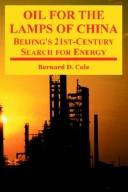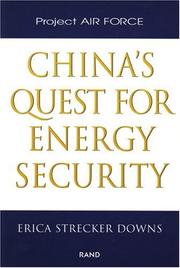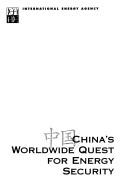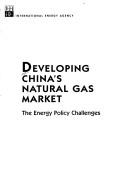| Listing 1 - 10 of 19 | << page >> |
Sort by
|

ISBN: 141021771X Year: 2004 Publisher: Honolulu : University Press of the Pacific,
Abstract | Keywords | Export | Availability | Bookmark
 Loading...
Loading...Choose an application
- Reference Manager
- EndNote
- RefWorks (Direct export to RefWorks)
Book
ISBN: 9781032561035 Year: 2024 Publisher: New York, NY : Routledge, 2024
Abstract | Keywords | Export | Availability | Bookmark
 Loading...
Loading...Choose an application
- Reference Manager
- EndNote
- RefWorks (Direct export to RefWorks)
"This book systematically constructs theories of clean energy diplomacy in the context of the changing international strategic landscape of energy and climate. It aims to explain the scientific connotations and innovative significance of clean energy diplomacy. The book focuses on analyzing how the development of renewable energy, including wind, solar, and biomass, plays out in the evolution of the international power system. It also touches upon energy efficiency and complementary energy technologies. This book integrates the studies of traditional energy and environmental diplomacy, and defines its connotations and extensions from the perspective of major country diplomatic strategy. Based on the latest developments of international clean energy diplomacy, the author also discusses China's strategic option of clean energy diplomacy in the broad context of the profound changes in global energy and climate governance. As a new diplomatic model to enhance national competitive advantages, clean energy diplomacy has attracted the attention of many countries. This book will therefore be of great interest to students and scholars of sustainable energy and environmental management, environmental politics and policy, and those interested in the low-carbon economy in general"--
CLEAN ENERGY --- CHINA --- ENERGY POLICY --- ENERGY POLICY--CHINA

ISBN: 0833028847 9786612451041 1282451049 0833048325 9780833048325 9781282451049 9780833028846 Year: 2000 Publisher: RAND Corporation
Abstract | Keywords | Export | Availability | Bookmark
 Loading...
Loading...Choose an application
- Reference Manager
- EndNote
- RefWorks (Direct export to RefWorks)
China's two decades of rapid economic growth have fueled a demand for energy that has outstripped domestic sources of supply. China became a net oil importer in 1993, and the country's dependence on energy imports is expected to continue to grow over the next 20 years, when it is likely to import some 60 percent of its oil and at least 30 percent of its natural gas. China thus is having to abandon its traditional goal of energyself-sufficiency--brought about by a fear of strategic vulnerability--and look abroad for resources. This study looks at the measures that China is taking to achieve ene
Energy policy --- Energy policy --China. --- Science and state -- China. --- Technology and state -- China. --- Industries --- Business & Economics --- Power resources --- E-books --- Energy policy - China
Book
ISBN: 1905050445 9781905050444 1280563052 9786610563050 Year: 2006 Publisher: London GMB
Abstract | Keywords | Export | Availability | Bookmark
 Loading...
Loading...Choose an application
- Reference Manager
- EndNote
- RefWorks (Direct export to RefWorks)
This report makes the point that in both Russia and China it is politics - and not market or commercial considerations - that largely drive energy relationships with each other and the outside world. For both countries, energy and energy security is regarded as a strategic asset and/or objective that are at risk from outside forces. Moreover, both countries are taking a statist - in Russia even patrimonial - approach to energy issues. Therefore cooperation between Russia and China will be difficult even though Russia wants to sell and China wants to buy. The conditions that each state has
Book
ISBN: 9782296570207 2296570208 Year: 2012 Publisher: Paris: L'Harmattan,
Abstract | Keywords | Export | Availability | Bookmark
 Loading...
Loading...Choose an application
- Reference Manager
- EndNote
- RefWorks (Direct export to RefWorks)
La Chine est devenue, en 2009, le premier pays consommateur d'énergie. Elle est passée dans le même temps de l'autosuffisance à une forte dépendance aux importations. A travers l'analyse des différents enjeux et des politiques mises en place aux niveaux national et international, les auteurs nous livrent des clés pour comprendre comment la Chine parviendra à sécuriser son approvisionnement énergétique sur le long terme.
Energy consumption --- Energy conservation --- Energy policy --- Forecasting --- CN / China - Chine --- 338.012 --- S10/0523 --- Energie (productiefactor) --- China: Economics, industry and commerce--Power supply (electricity, mining, oil) and computing industry --- Energy consumption - China - Forecasting --- Energy conservation - China - Forecasting --- Energy policy - China

ISBN: 1280033363 9786610033362 9264181334 9264176489 Year: 2000 Publisher: Paris : OECD Publishing,
Abstract | Keywords | Export | Availability | Bookmark
 Loading...
Loading...Choose an application
- Reference Manager
- EndNote
- RefWorks (Direct export to RefWorks)
China’s rapid growth over the past twenty years has sparked a surging demand for energy. The Chinese made strenuous efforts to exploit their domestic resources; but growth eventually overwhelmed them and led to rising oil imports. Within the next decade, China’s oil imports are expected to grow rapidly and outstrip those of many OECD countries. Gas imports are also projected to increase as China switches to cleaner energy. Aware of its growing dependency on imported energy, China seeks a more prominent position in the existing global system of energy production and trade. Where it can, China seeks to open new connections in global markets. Increasingly, external energy policies are entwined in foreign economic and security policies in general. This book documents how China is creating energy relationships across the Middle East, Southeast Asia, Russia, Central Asia and Africa. The Chinese are also intensively studying how the rest of the world operates in the energy sector. The position of this vast nation in the global energy markets can only grow stronger as time passes. Trade and investment are the main elements in China’s energy policy toward the rest of the world today. Before long, the Chinese may seek to participate in the actual management of overseas energy facilities.
Energy development -- Government policy -- China. --- Energy policy -- China. --- Power resources -- China. --- Energy policy --- Energy development --- Power resources --- Business & Economics --- Industries --- Government policy --- Energy and state --- State and energy --- Industrial policy --- Energy conservation --- China, People’s Republic --- Politique énergétique --- Energie --- Ressources énergétiques --- Développement --- Politique gouvernementale

ISBN: 9264190724 128003372X 9786610033720 9264190723 9264198377 Year: 2002 Publisher: Paris : OECD Publishing,
Abstract | Keywords | Export | Availability | Bookmark
 Loading...
Loading...Choose an application
- Reference Manager
- EndNote
- RefWorks (Direct export to RefWorks)
Driven by an increasing recognition of the many advantages of natural gas and by the need to diversify its coal-dominated energy supply, China’s natural gas industry is poised for rapid expansion. This study describes China’s gas market situation and examines the key issues facing its industry and policy makers. Drawing on the experiences and lessons from developed gas markets around the world and taking into account the specific circumstances of the Chinese gas market, it also offers a number of policy suggestions for the Chinese government to consider in its effort to boost the country’s natural gas industry.
Energy policy -- China. --- Gas industry -- China -- Management. --- Natural gas -- China. --- Natural gas --- Energy policy --- Gas, Natural --- Sour gas --- Gases, Asphyxiating and poisonous --- Hydrocarbons --- China, People’s Republic --- China --- Natural Gas Market --- Gas industry --- Gaz --- Politique énergétique --- Gaz naturel --- Management. --- Industrie --- Gestion
Book
ISBN: 3642451691 3642451705 Year: 2014 Publisher: Berlin, Heidelberg : Springer Berlin Heidelberg : Imprint: Springer,
Abstract | Keywords | Export | Availability | Bookmark
 Loading...
Loading...Choose an application
- Reference Manager
- EndNote
- RefWorks (Direct export to RefWorks)
This book builds on the analyses of Eugene and Howard Odum and introduces the concept of systems ecology. Ecological emergy accounting represents a breakthrough because it allows researchers to integrate man-made capital and natural capital so that human and natural concerns can be addressed using a consistent system of units. This book develops an emergy accounting model that is suitable for describing urban systems, thereby providing a comprehensive picture of those systems. To make the theory concrete, the authors use China’s Macao Special Administrative Region as a case study, and compare the results for Macao with those of other urban ecosystems around the world in the fields of ecological economy, tourism, waste treatment, gambling industry, land reclamation and resource consumption etc. Dr. Kampeng Lei is a scientist of Macau Science and Technology Association, Macao, China; Shaoqi Zhou is a professor at the College of Environment and Energy, the South China University of Technology, and the Guizhou Academy of Sciences, China; Zhishi Wang is a professor at the Faculty of Science and Technology, the University of Macau, Macao, China.
Economic development -- China. --- Energy policy -- China. --- Natural resources -- China. --- Energy policy --- Power resources --- Management --- Energy --- Energy resources --- Power supply --- Energy and state --- State and energy --- Government policy --- Environment. --- Energy policy. --- Energy and state. --- Energy industries. --- Environmental management. --- Environmental Management. --- Energy Policy, Economics and Management. --- Energy Economics. --- Natural resources --- Energy harvesting --- Energy industries --- Industrial policy --- Energy conservation --- Environmental stewardship --- Stewardship, Environmental --- Environmental sciences
Book
ISBN: 1281746517 9786611746513 9264027319 9264027300 Year: 2007 Publisher: Paris : OECD/IEA,
Abstract | Keywords | Export | Availability | Bookmark
 Loading...
Loading...Choose an application
- Reference Manager
- EndNote
- RefWorks (Direct export to RefWorks)
World leaders have pledged to act to change the energy future. Some new policies are in place. But the trends in energy demand, imports, coal use and greenhouse gas emissions to 2030 in this year's World Energy Outlook are even worse than projected in WEO 2006. China and India are the emerging giants of the world economy. Their unprecedented pace of economic development will require ever more energy, but it will transform living standards for billions. There can be no question of asking them selectively to curb growth so as to solve problems which are global. So how is the transition to be a
Energy consumption -- China. --- Energy consumption -- India. --- Energy development. --- Energy industries. --- Energy policy -- China. --- Energy policy -- India. --- Power resources -- China. --- Power resources -- India. --- Business & Economics --- Industries --- Power resources --- Energy development --- Economic aspects. --- Energy --- Energy resources --- Power supply --- Natural resources --- Energy harvesting --- Energy industries
Book
ISBN: 3642258867 3642429548 3642258875 1280397667 9786613575586 Year: 2012 Publisher: New York : Springer,
Abstract | Keywords | Export | Availability | Bookmark
 Loading...
Loading...Choose an application
- Reference Manager
- EndNote
- RefWorks (Direct export to RefWorks)
In the new millennium, understanding China’s energy economy is crucial for politicians, businesspeople and energy economists, as China’s energy policy choices will mean both challenges and opportunities for the world in terms of an increasing share of primary energy consumption and investment. This book initially reviews the literature on China’s energy economy and in so doing reveals that many important areas have been overlooked or are outdated in their coverage. Given the size of China and its global importance, the book then review s China’s current energy situation and fills the gaps in the literature for those who are interested in and concerned about China’s economic development and energy reform in the new millennium. The book is different from previous studies in several important ways: Firstly, it presents recent, pioneering research rather than a simple textbook, several sections of which have been published in high-quality energy journals. Secondly, the book first subdivides China's energy intensity change into aspects of budget constraint, technological change, factor substitution, energy demand and economic growth using a newly developed econometric approach. Thirdly, it provides many new and different econometric findings and derives many new policy implications for China's energy economy. And lastly, it brings to light a wealth of new knowledge for those who are interested in China's energy economy, the world energy market and global environmental and climate change issues.
Energy policy -- China. --- Power resources -- China. --- Business & Economics --- Physics --- Physical Sciences & Mathematics --- Industries --- Physics - General --- Power resources --- Energy policy --- Energy. --- Energy policy. --- Energy and state. --- Energy, general. --- Energy Policy, Economics and Management. --- Energy and state --- State and energy --- Industrial policy --- Energy conservation --- Government policy
| Listing 1 - 10 of 19 | << page >> |
Sort by
|

 Search
Search Feedback
Feedback About UniCat
About UniCat  Help
Help News
News